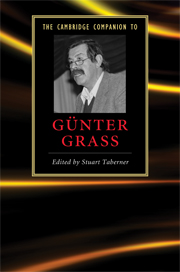Book contents
- Frontmatter
- Introduction
- 1 Biography as politics
- 2 Günter Grass’s political rhetoric
- 3 The exploratory fictions of Günter Grass
- 4 Günter Grass and magical realism
- 5 Günter Grass’s ‘Danzig Quintet’
- 6 Günter Grass and gender
- 7 Authorial construction in From the Diary of a Snail and The Meeting at Telgte
- 8 Günter Grass’s apocalyptic visions
- 9 Günter Grass and German unification
- 10 Günter Grass’s Peeling the Onion
- 11 Günter Grass as poet
- 12 Günter Grass and art
- 13 Günter Grass as dramatist
- 14 Film adaptations of Günter Grass’s prose work
- 15 Günter Grass and his contemporaries in East and West
- Guide to further reading
- Index
2 - Günter Grass’s political rhetoric
Published online by Cambridge University Press: 28 January 2010
- Frontmatter
- Introduction
- 1 Biography as politics
- 2 Günter Grass’s political rhetoric
- 3 The exploratory fictions of Günter Grass
- 4 Günter Grass and magical realism
- 5 Günter Grass’s ‘Danzig Quintet’
- 6 Günter Grass and gender
- 7 Authorial construction in From the Diary of a Snail and The Meeting at Telgte
- 8 Günter Grass’s apocalyptic visions
- 9 Günter Grass and German unification
- 10 Günter Grass’s Peeling the Onion
- 11 Günter Grass as poet
- 12 Günter Grass and art
- 13 Günter Grass as dramatist
- 14 Film adaptations of Günter Grass’s prose work
- 15 Günter Grass and his contemporaries in East and West
- Guide to further reading
- Index
Summary
My concern in this chapter is with the rhetoric of Günter Grass's political speeches. I use the term 'political' broadly to characterise orations on matters of public and social interest, particularly where they intersect with moral and ethical concerns. To judge by sheer quantity alone, Grass's speeches and the political activity they represent are an important adjunct to his fictional and poetic work, a view he has endorsed on many occasions while always insisting on their entirely distinct mediations of reality. As a further measure of the importance Grass attaches to politics, he has been willing to sideline his 'creative' writing for lengthy periods, for example in the mid-to-late 1960s and early 1970s, when his electoral campaigning for the Social Democratic Party caused a hiatus in his literary output. Moreover, Grass's speeches are worthy of attention as they document political interventions on a plethora of issues over almost five decades, while the controversies they often provoke have sometimes conditioned the reception of his creative work, as other contributions to this volume demonstrate. In finding a political platform, Grass, as is widely recognised, was initially assisted by the fame afforded by the meteoric success of The Tin Drum (1959), not least as it extended - unusually for a German writer - to the international stage. With the possible exception of his older, fellow German Nobel laureate, Heinrich Böll, he has commanded a public role like no other writer. Moreover, Grass's breakthrough coincided with a pivotal era in postwar West German society and politics, as well as with a new, more expansive phase in the development of the German media which were ever eager to solicit the views of the country's best-known authors.
- Type
- Chapter
- Information
- The Cambridge Companion to Günter Grass , pp. 24 - 38Publisher: Cambridge University PressPrint publication year: 2009
- 2
- Cited by



